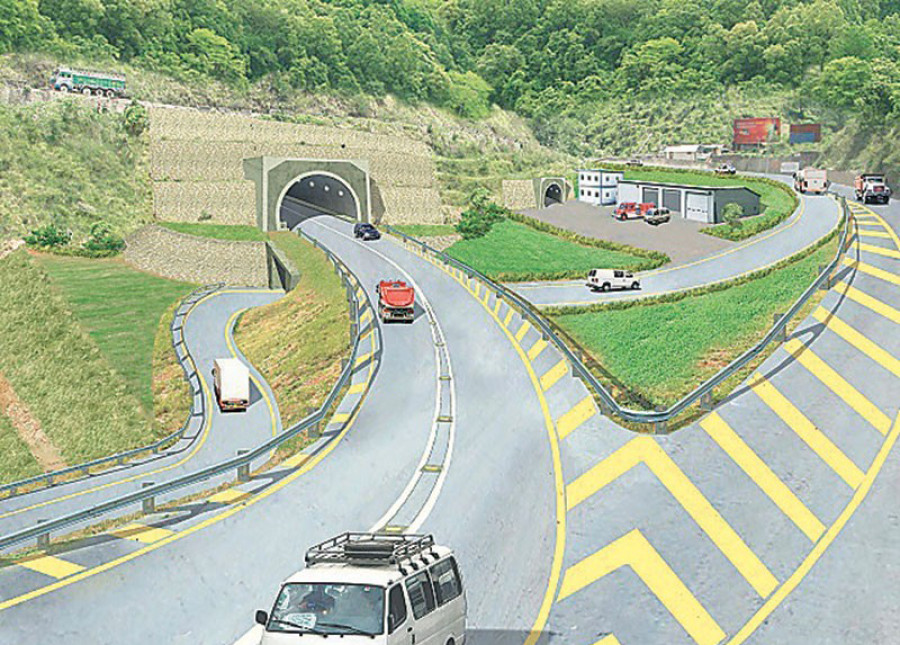Money
Nagdhunga Tunnel project's launch delayed again
The project envisages boring a tunnel through the western hills and eliminating the many switchbacks on the main highway leading out of Kathmandu.
Prahlad Rijal
The Roads Department’s plan to appoint Japanese developer Hazama Ando JV to build the Nagdhunga Tunnel is held up as the donor Japan International Cooperation Agency (JICA) is still looking over the contract document and has not given its okay.
The department had expected to award the contract by the fiscal year 2018-19, but the tunnel project office has not received confirmation. Officials said the project launch had been pushed back to September from August as a result.
“We should have received approval from JICA by now, but the donor has not responded. We have extended the mobilisation period to September because of the delay,” said project chief Shyam Kharel. “Although the exact contract amount cannot be disclosed yet, it is likely to be Rs14 billion to Rs15 billion.”
The Post’s request for comment from JICA were not immediately successful. A staffer reached over the phone said he was not authorised to speak to the media.
The project envisages boring a tunnel through the western hills and eliminating the many switchbacks on the main highway leading out of Kathmandu. The tunnel linking Nagdhunga and Sisne Khola will cut travel time and avoid traffic jams on the capital's key supply route.
According to the loan agreement signed between the government of Nepal and JICA, the implementing agency must seek the concurrence of the donor after selecting a contractor. During the concurrence, the donor makes sure the contract conditions are in line with the bidding document.
The project was expected to complete land acquisition by 2018, but it did not happen because of conflict with locals. The Department of Roads initiated the process to acquire land in Kathmandu and Dhading nearly a year ago, but it has not been able to strike a deal with locals at Dhading.
“We have spent around Rs4.5 billion to acquire land in Kathmandu and are trying to settle a deal with locals of Dhading who have posed obstructions,” said Kharel. “The owners of around 44 ropanis out of the 100 ropanis that need to be acquired in Dhading have demanded the same compensation amount paid to the landowners in Kathmandu.”
In 2016, the Japan government had agreed to provide a soft loan of Rs15.28 billion to build the Nagdhunga Tunnel, improve the alignment of the existing entry point to Kathmandu and ease traffic volume by allowing heavy vehicles to move on the alternative route, avoiding at least 19 hairpin bends and sharp curves along an 8 km section of the roadway.
As per a project study conducted by the donor agency, traffic volume on the Nagdhunga section is increasing every year with heavy vehicles accounting for 48 percent of the total traffic.
“The average travel speed of Kathmandu-bound heavy trucks is less than 16 km per hour. On the uphill sections in the morning, the travel speed is just around 10 km per hour. The average time taken to traverse the 8-km section is 34 minutes,” states the study.
The entire cost of the project is expected to hover around 22.1 billion yen (approximately Rs20.2 billion), of which 75 percent would be covered by the soft loan being extended by the Japanese government. The government has allocated Rs6.27 billion to implement the tunnel project in fiscal year 2019-20.
The loan is being provided at an annual interest rate of 0.01 percent for a period of 40 years. The credit also comes with a grace period of 10 years, meaning the government can begin repaying the loan after 10 years of acquiring the funds.
Earlier, after the project authorities announced that they intended to award the contract to the Japanese developer after disqualifying four Chinese bidders, criticism surfaced that the Japanese contractor was given preferential treatment in the bid evaluation process due to lobbying by the donor.
JICA countered the claim saying it had no part to play in the contractor selection process, apart from giving concurrence after authorities selected the builder.
“There is no such a fact that JICA made any influence in the contractor selection process. All the procurement process is performed by the Implementing Agency of the Government of Nepal following the bidding document, and there is no chance for JICA to intervene in the process,” the agency told the Post in an email.
The project, which will be overseen by the Ministry of Physical Infrastructure and Transport, is expected to be completed within three and a half years from the date of implementation.
Japanese infrastructure developer Hazama Ando JV has executed projects such as the Koteshwor-Suryabinayak road section and the 158-km BP Highway, also known as Banepa-Bardibas Highway.
What do you think?
Dear reader, we’d like to hear from you. We regularly publish letters to the editor on contemporary issues or direct responses to something the Post has recently published. Please send your letters to [email protected] with "Letter to the Editor" in the subject line. Please include your name, location, and a contact address so one of our editors can reach out to you.




 20.12°C Kathmandu
20.12°C Kathmandu














